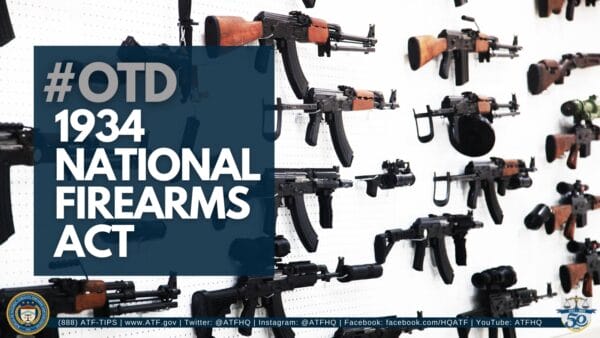
Why wouldn’t a citizen have a statutory right to appeal a National Firearms Act denial? A video released Friday by attorney Stephen Stamboulieh details the conflicting opinions he and co-attorney Alan Beck had to slog through when they demanded answers in Umbert v. United States, a case they litigated five years ago made moot last June when the government gave their plaintiffs the relief they’d requested.
It should be a straightforward enough process and you’d think the Bureau of Alcohol, Tobacco, Firearms and Explosives, the Federal Bureau of Investigation, and the Department of Justice would be on the same page, instead of pointing fingers, abdicating responsibilities, and just plain getting things wrong, especially considering how they increasingly hold Federal Firearms Licensees to “zero tolerance standards” over paperwork glitches. The adage “Do as we say, not as we do,” comes to mind.
With NFA items, you’d think there’d be special care in light of all the hoops applicants, and FFLs have to jump through in order to get firearms, suppressors, and other items “legally” taxed and registered, but as this column has documented in the past, that’s never been the case. In 2008’s U.S. v. Friesen, statistician Fritz Scheuren testified the National Firearms Registration and Transfer Record is so unreliable that it’s “insufficient for criminal proceedings.”
“ATF and FBI, at one point, and this was back in 2018, had stopped allowing people that were denied erroneously or non-erroneously to be able to appeal their background checks,” Stamboulieh recalled as the reason he sued. And there’s a significant difference in who processes them from non-NFA firearms transfers.
“Anyone wishing to possess an NFA firearm … must fully complete and submit an application to the ATF,” Stamboulieh explains. “Before the application may be approved the background check must be conducted. As part of that background check ATF [does it] as opposed to the FFL, because normally, when you’re doing a firearm transfer, you go to an FFL and the FFL is the one that actually does the background check through FBI. But in this case, it’s ATF. It says it’s required by regulation to contact NICS [National Instant Background Check System]…”
“I have had so many people contact me about [being] erroneously denied a firearm,” Stamboulieh continues. “The NICS process is a complete disaster.” To illustrate, he recalls a white Oklahoma doctor who was denied because of a protection order. Except he didn’t have one issued against him; it was against a different doctor from New Jersey!
And then there was the question of who was supposed to do what.
“[T]he ATF and the FBI got into a little bit of a lover spat,” he recalls. “ATF wanted the FBI to continue to process NICS background checks and the FBI wanted the ATF to start processing NICS background checks.”
The bottom line is that neither the FBI nor ATF wanted to process the numerous erroneous denials, leaving no appeal remedy, and they had some “choice words to go back and forth with each other, Stamboulieh notes. “It’s pretty funny.”
In a way. It’s also pretty intolerable, and it’s good that Stamboulieh can laugh about it, considering he and attorney Beck are about $150,000 out of pocket in unrecoverable legal costs.
The result, through his and Beck’s persistence, which included much communication with the agencies, and flying to Washington DC and meeting with congressional staffers, along with ATF/FBI fear of being “spanked” in federal court, is an appeals process “that mimics what the FBI already does for regular Title 1 firearms like a handgun…” An “agreement to formalize the process was signed by ATF and FBI in October 2023 and goes into effect January 2024.”
The agreement between ATF and the FBI allows individuals to use administrative appeals processes of FBI’s National Instant Criminal Background Check System (NICS) to attempt to resolve record-related issues that are revealed during a NICS background check initiated as part of that individual’s NFA application. In addition, the agreement recognizes an NFA applicant may use the Voluntary Appeal File (VAF) when NICS responds with a “delayed” recommendation to the NFA applicant’s background check. The “delayed” or “denied” NFA applicant will receive a letter from ATF’s NFA Division advising how to take advantage of each respective process and the associated NICS Transaction Number (NTN) for “denied” NFA applications.
Stamboulieh’s video follows. Any reader who experiences an NFA denial and believes it should be contested can contact him at Stamboulieh Law, PLCC.
About David Codrea:
David Codrea is the winner of multiple journalist awards for investigating/defending the RKBA and a long-time gun owner rights advocate who defiantly challenges the folly of citizen disarmament. He blogs at “The War on Guns: Notes from the Resistance,” is a regularly featured contributor to Firearms News, and posts on Twitter: @dcodrea and Facebook.

from https://ift.tt/2z6BaZg
via IFTTT

No comments:
Post a Comment